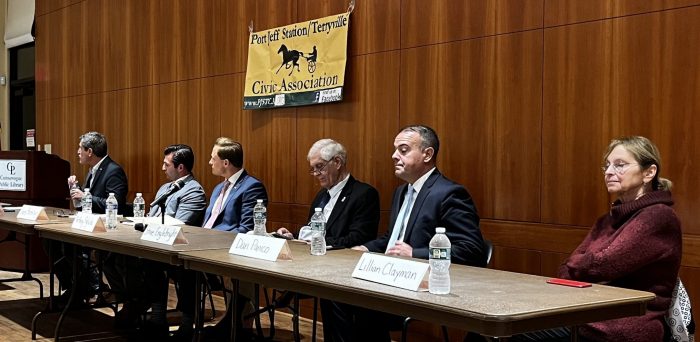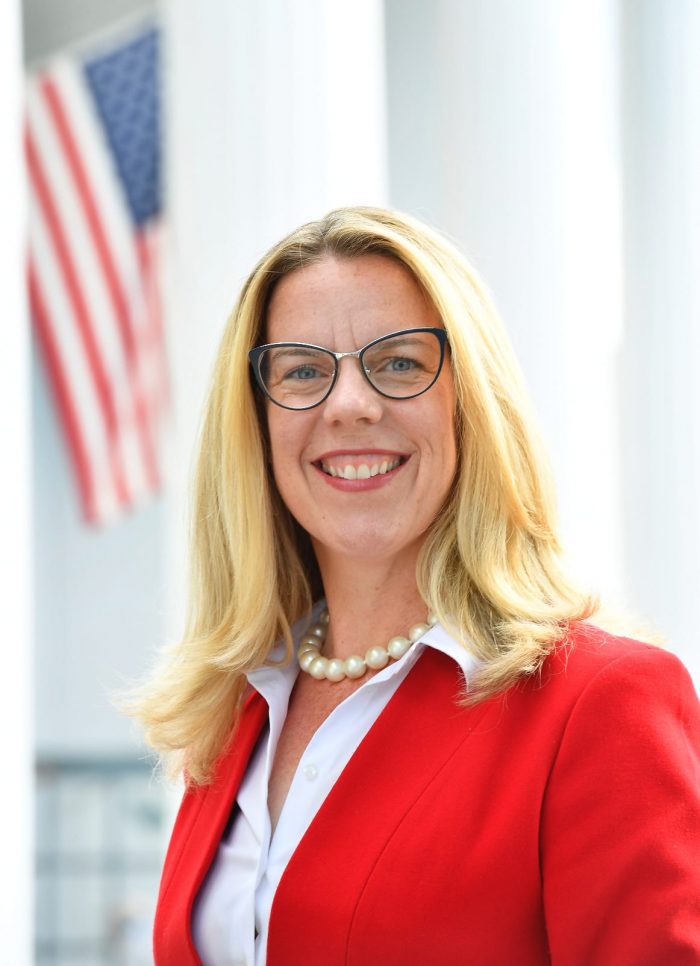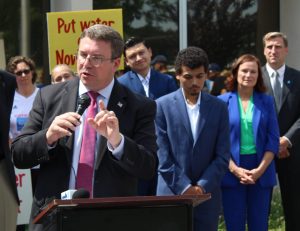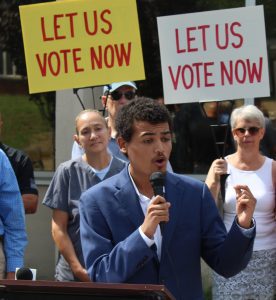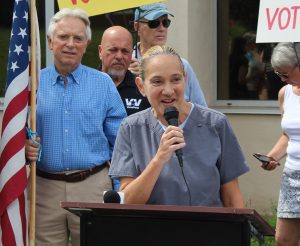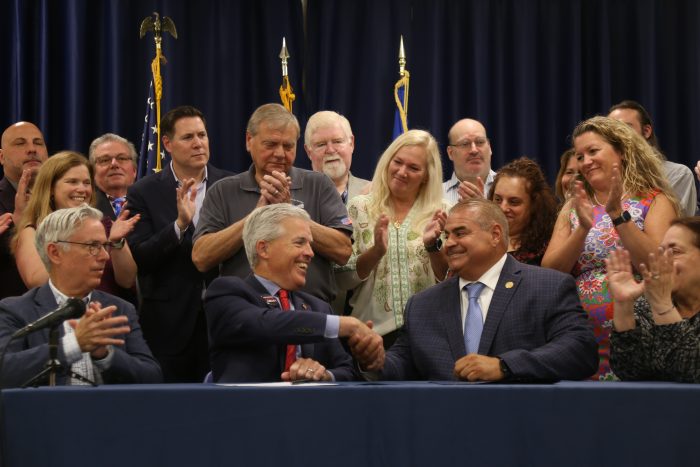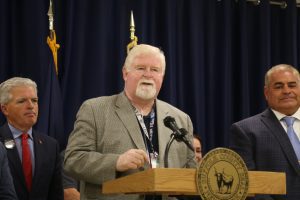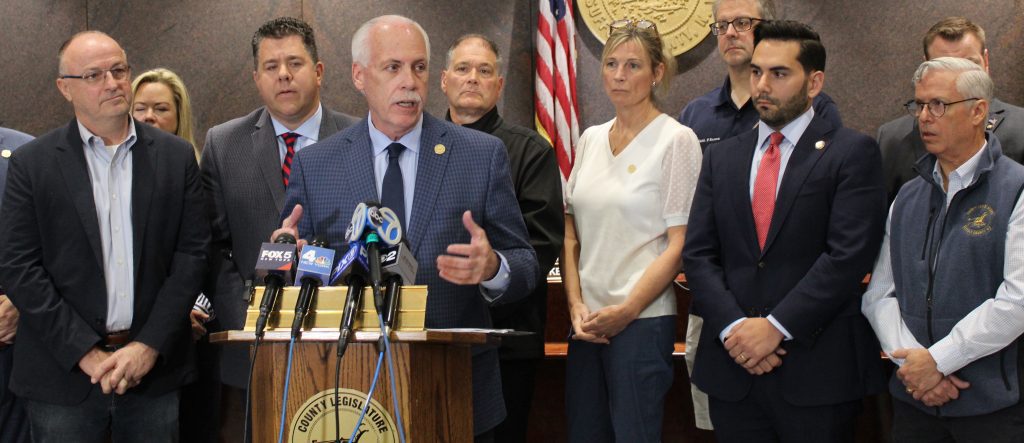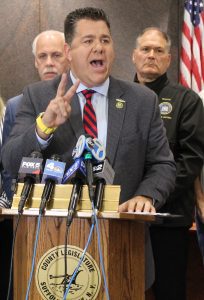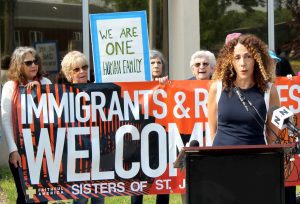By Raymond Janis and Aidan Johnson
As returns came in Tuesday night, Nov. 7, electricity pulsed through Suffolk GOP headquarters.
Republicans flipped the Suffolk County executive’s seat for the first time in two decades, with Town of Brookhaven Supervisor Ed Romaine cruising to victory over his Democratic opponent, businessman Dave Calone, by a 57-43% margin as of Wednesday morning.
“Thank you, Suffolk,” the county executive-elect told the audience assembled at Stereo Garden in Patchogue. “You’ve given me a large mandate tonight — you’ve crushed it.”
“And we’re going to use that mandate to move this county forward,” he added.
Calone concedes, county executive transition commences
At the Democratic headquarters in Holtsville, Suffolk County Democratic Committee chairman and Town of Babylon supervisor, Rich Schaffer, addressed the deflated crowd as the results started to come in.
“Obviously, we would have wanted to be on the winning side tonight, but we know that what we are up against is not only the atmosphere created out of Albany, the atmosphere that’s created out of Washington, and that has hurt us here as a brand in Suffolk County,” he said.
In his concession speech, Calone thanked his family, team, running mates and outgoing county executive Steve Bellone (D), along with his supporters.
“I want to thank the people of Suffolk County for the last year, for the chance to visit with you, your families from one end of this county to the other,” he said. “And I am so proud of the ticket we put together.”
“I promise to continue working with all of you as we move and push meaningful solutions that affect the lives of the people of Suffolk County,” Calone added.
Bellone congratulated Romaine on his victory, pledging to do “everything I can to assist the new county executive-elect and his administration.”
“I am committed to ensuring a seamless transition and handover of responsibilities to the new administration beginning on Jan. 1,” he said in a statement. “To that end, I have asked Chief Deputy County Executive Lisa Black to lead our administration’s efforts to coordinate with the incoming administration.”
Republicans expand county Legislature majority
Romaine’s victory was fortified by steady gains in the county Legislature.
Chad Lennon (R-Rocky Point) flipped the county’s 6th Legislative District, besting Dorothy Cavalier (D-Mount Sinai) 61-39% in the race to succeed termed-out Suffolk County Legislator Sarah Anker (D-Mount Sinai).
“I would not be here today without you,” Lennon told the audience. “Thank you for entrusting me. I’m looking forward to a successful two years.”
Majority Leader Nick Caracappa (C-Selden) won reelection in the 4th District over Timothy Hall 64-36%. Additionally, incumbent Legislator Leslie Kennedy (R-Nesconset) cruised to reelection with 69% of the vote in the 12th District. And Legislator Rob Trotta (R-Fort Salonga) won his uncontested race in the 13th District with over 99% of the vote.
In Huntington, incumbent Legislator Stephanie Bontempi (R-Centerport) narrowly defeated her Democratic Party challenger Dr. Eve Meltzer-Krief, of Centerport, 53-47% in the 18th District.
Former state Assemblyman Steve Englebright (D-Setauket) defeated Anthony Figliola (R-East Setauket) 53-47%, winning the 5th District seat left vacant by Legislator Kara Hahn (D-Setauket).
“I’m looking forward to working on the environmental issues that are tied to the economy, such as tourism, and we really have a chance with the people who are being elected here tonight to make a difference going forward in the county Legislature,” Englebright said, before all of the final results had come in.
According to the unofficial results, the Republicans gained one seat in the county Legislature, giving the party a veto-proof 12-6 supermajority.
Town-level victories
The GOP racked up considerable victories across the towns of Brookhaven, Smithtown and Huntington.
In the race to succeed Romaine as supervisor of the county’s largest township, Brookhaven Deputy Supervisor Dan Panico (R) defeated SUNY Old Westbury professor Lillian Clayman (D) 62-38%.
“We know what our mandate is,” the supervisor-elect said. “We are going to govern correctly. We are going to be bold in our initiatives. This is a new day in the Town of Brookhaven, and I am proud to be the supervisor.”
Panico pledged to redirect the focus of the town government toward traditionally nonconservative areas, adding, “We are going to make major inroads throughout this entire town.”
Alongside Panico, Republicans held onto their 5-1 majority on the Town Board. Councilwoman Jane Bonner (R-Rocky Point) and Councilman Neil Manzella (R-Selden) were both reelected carrying 65% of the votes in their districts.
Incumbent Councilmember Jonathan Kornreich (D-Stony Brook) retained his seat with a 55-45% margin of victory over Republican challenger Gary Bodenburg.
“For the past three years, I have worked hard to represent the more than 80,000 residents of Three Village, Port Jefferson village, Port Jefferson Station and Terryville, and last night the community hired me to serve another term,” Kornreich said in a statement.
“I love this community and promise to keep showing up for them day in and day out, celebrating our successes and sharing our challenges,” he added.
Brookhaven voters also reelected incumbent Highway Superintendent Dan Losquadro (R) and Receiver of Taxes Louis Marcoccia (R) with 62% and 63%, respectively.
Republicans swept each townwide race in Smithtown. Town clerk candidate Tom McCarthy — not the incumbent town councilman — cruised to victory over Bill Holst (D) carrying 65% of the townwide vote. Incumbent Smithtown Receiver of Taxes Deanna Varricchio (R) retained her seat by a 2-1 margin of victory over challenger Amy Fortunato (D). For Town Board, incumbent town Councilman Thomas Lohmann (R) and Councilwoman Lisa Inzerillo (R) each carried 33% of the vote over Democratic challengers Maria Scheuring and Sarah Tully.
In Huntington, Republicans expanded their majority on the Town Board to a sweeping 5-0, if the unofficial results hold. In an extremely close four-way contest, Republican candidates Brooke Lupinacci and Theresa Mari edged their Democratic counterparts Jen Hebert and Don McKay. Lupinacci and Mari received 25.5% and 25.4% of the vote respectively to Hebert’s and McKay’s 25% and 23.9% share respectively.
Incumbent Receiver of Taxes Jillian Guthman (D) was reelected over Pamela Velastegui (R) 53-47%, and incumbent Town Clerk Andrew Raia (R) won reelection over Linda Davis Valdez (D) 57-43%.


